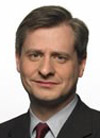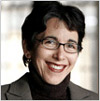Responding to the widespread and growing lack of civility in U.S. society, the University St. Thomas has begun a multifaceted effort to study and promote the concept of civil discourse.
The university already has $1 million of the $3.5 million it plans to raise to support an Endowed Chair in Civil Discourse. It also started a pilot, co-curricular program for first-year students that champions civility; is proposing a civil-discourse requirement for graduation; and has created an annual Public Discourse Lecture Series dealing with civility.

Jon Meacham
The first lecture in that series, "Conflict and Civility in the Age of Obama," will be given by Newsweek editor and author Jon Meacham at 7:30 p.m. Tuesday, Feb. 16, in the auditorium of O'Shaughnessy Educational Center on the university's St. Paul campus.
The lecture is sponsored by the St. Thomas College of Arts and Sciences and is free and open to the public. Moderator for the evening will be Tom Crann, host of "All Things Considered" for Minnesota Public Radio News.
The series, explained Dr. Marisa Kelly, dean of the College of Arts and Sciences, will strive to promote discussion of important ideas without the aggression, anger and obstinacy that often cloud such matters in today's world.
Examples can be seen regularly on radio and television; on a more personal level, they can be found in e-mail messages, or while driving to work.

Dr. Marisa Kelly
"In recent years our society has witnessed a breakdown of civility surrounding contentious moral and political issues," Kelly said. "Both locally and nationally, there is an urgent need to promote the concept of civil discourse. We are responding to a cultural problem that unfortunately has become commonplace."
The idea for the lecture series, Kelly said, was developed by the College of Arts and Sciences Board of Advisers and, in part, grew out of St. Thomas' experiences in recent years with controversies that have involved speakers, films, books and policies.
When funded, the new Endowed Chair in Civil Discourse will be housed within the College of Arts and Sciences and will oversee and promote civility-related initiatives throughout the university and the broader community. The date when a tenured professor is hired for that position will depend on fundraising success.
The proposal for a civility-related program for first-year St. Thomas students is being refined and will be based on a pilot program, called "Connect Four," that was developed and launched this fall by the university's Division of Student Affairs.
This fall, 65 freshmen have volunteered to participate in the Connect Four project that encourages them to be involved in campus activities while learning about civil discourse. Over the course of a semester, the Connect Four students attend 15 events and meetings and complete a series of written reflections.
A goal of the project is to expose the students to four key parts of the St. Thomas mission statement: think critically, act wisely, work skillfully and advance the common good.
"Many of our efforts to promote civility will build on what is already in place at St. Thomas," Kelly said. "It is critical that we connect these efforts directly to our mission. We want to build on our strengths. You cannot educate students to be morally responsible leaders if they are not committed to civil discourse."
Meanwhile, faculty on the St. Thomas Core Curriculum Committee are developing a civil-discourse requirement for graduation that would be patterned after an existing human-diversity requirement that undergraduates must complete before receiving a St. Thomas diploma.
Like the human-diversity requirement, St. Thomas students would not take a specific civil-discourse class, but they would be required to select from existing courses with a focus on civil discourse. "One clear example is a philosophy class focused on the use of logic as a way to engage in the civil discussion of important ideas," Kelly said, "or it could be a chemistry class that ties the use of scientific data to the practice of civil discourse."
The proposal for a civil-discourse requirement is being refined and must receive faculty approval before implemented. That could happen by the start of fall semester in 2010.
A final component will be to integrate and highlight civil-discourse efforts underway in a range of existing programs that St. Thomas already sponsors or co-sponsors. Some possibilities include the Jay Phillips Center for Interfaith Dialogue, Muslim Christian Dialogue Center, Whalen Symposium in Media Ethics, Minnesota Public Radio Broadcast Journalist Series, University Lecture Series and the Václav Havel Civil Society Symposium.
"Our goal is to graduate students who not only have an awareness and understanding of this growing problem, but the skills to engage in civil discourse in their communities after they leave campus," Kelly said. "We would be happy to be known as the nation's 'civil discourse' university."






